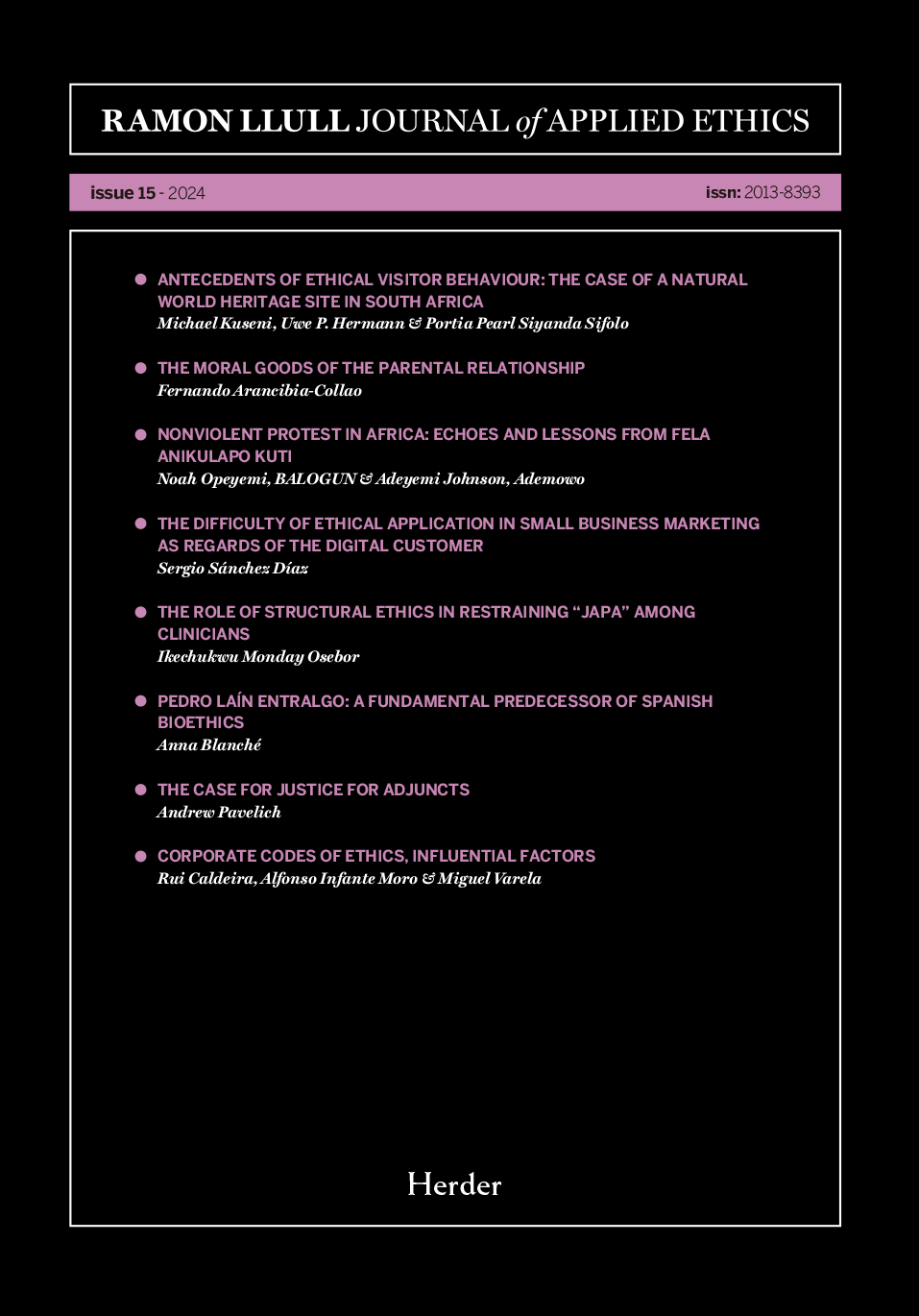The case for justice for adjuncts
Article Sidebar

Main Article Content
In the United States, about 40% of classes in colleges and universities are taught by adjunct faculty. In recent years, adjuncts and their advocates have argued that such faculty are treated immorally by their employers: working long hours for comparatively little pay, with no benefits or job security, and with little respect within the university. The description of adjunct working conditions is generally accepted as accurate, but there is debate about whether institutional treatment of adjuncts amounts to injustice. There three main reasons why universities – and many full-time faculty – argue that such conditions are morally allowable: first, that adjuncts choose their work in a free and open labor market with many non-academic options; second, that remedying the situation would require tremendous amounts of money, and raising it would unjustly burden students; and third, that changing the status quo would not necessarily help all current adjuncts. I argue that the treatment of adjuncts is unjust by taking these three defenses of the status quo in turn. I first focus on the ethics of sweatshops, which helps to show that a freely chosen job can still be exploitive and unjust, and leads to the idea that the morally required solution is to convert adjunct-taught faculty into Full-time Lecturer positions. I then argue that much of the problem could be solved with a 10% increase in tuition (or other revenue), which is an acceptable price to pay to create a more just environment. Third, I argue that even if there are short-term disruptions, protecting the marginal utility of some workers is not justification for maintaining an unjust economic system. I conclude by noting that many universities say that social justice is a central part of their missions, which makes their continuation of an unjust two-tiered system of faculty employment particularly problematic.
Article Details
AAUP (2020). “The Annual Report on the Economic Status of the Profession, 2019–20.” Last modified May 2020. https://www.aaup.org/sites/default/files/2019-20_ARES.pdf
AAUP (2021). “2020-21 Faculty Compensation Survey Results.” https://www.aaup.org/2020-21-faculty-compensation-survey-results
Bartkowiak, Julia (1993). “Trends Towards Part-Time Employment: Ethical Issues” Journal of Business Ethics 12(10), 811-815.
Bettinger, Eric, and Long, Bridgette (2010). “Does Cheaper Mean Better? The Impact of Using Adjunct Instructors on Student Outcomes.” The Review of Economics and Statistics 92(3), 598-613.
Beyer, Gerald J. (2017). “Advocating Worker Justice: A Catholic Ethicist’s ‘Toolkit’.” Journal of Religious Ethics 45(2), 230-254.
Bradner, Alexandra (2022). “The Cruelty of the Adjunct System”, in Academic Ethics Today: Problems, Policies, and Prospects for University Life, ed. Steven M. Cahn, Rowman and Littlefield press, 145-155.
Bramhall, Ron (2014). “Turning Back the Tide on Contingency” Academe 100(5), 27-29.
Brennan, Jason, and Phillip Magness (2018a). “Estimating the Cost of Justice for Adjuncts: A Case Study in University Business Ethics.” Journal of Business Ethics 148(1), 155-168.
Brennan, Jason, and Phillip Magness (2018b). “Are Adjunct Faculty Exploited: Some Grounds for Skepticism” Journal of Business Ethics 152(1), 53-71.
California (2020). Labor Code, section 515.7, “Employment Regulation and Supervision: Working Hours”. https://leginfo.legislature.ca.gov/faces/codes_displaySection.xhtml?lawCode=LAB§ionNum=515.7.
Chronicle of Higher Education (2020). “Median Salaries of College Presidents, 2019-20.” August 16, 2020. https://www.chronicle.com/article/median-salaries-of-college-presidents-2019-20.
Droege, Paula (2008). “Life as an Adjunct: Theorizing Autonomy from the Personal to the Political.” Journal of Social Philosophy 39(3), 378-392.
Eagan, Kevin M., Jaeger, Audrey J. and Grantham, Ashley (2015). “Supporting the Academic Majority: Policies and Practices Related to Part-Time Faculty’s Job Satisfaction.” The Journal of Higher Education 86(3), 448-480.
Faraci, David (2019). “Wage Exploitation and the Nonworseness Claim: Allowing the Wrong, To Do More Good.” Business Ethics Quarterly 29(2), 169-188.
Gaski, John F. (2004). “Raising the Minimum Wage is Unethical and Immoral.” Business and Society Review 109(2), 209-224.
Hemelt, Steven W. and Dave E. Marcotte (2011). “The Impact of Tuition on Enrollment at Public Colleges and Universities.” Educational Evaluation and Policy Analysis 33(4), 435-457.
Hill, Scott, and Klocksiem, Justin (2022). “Adjuncts are Exploited”. Philosophia 50(3), 1153-1173.
Hoeller, Keith (2014). "The Academic Labor System of Faculty Apartheid" in Equality for Contingent Faculty: Overcoming the Two-Tier System, ed. Keith Hoeller, Vanderbilt University Press, 116-155.
Hose, Linda, and Ford, E. J. (2014). “Caught in the Adjunct Trap” Learning and Teaching: The International Journal of Higher Education in the Social Sciences 7, No. 1, Special Issue (Spring), 46-56.
Internal Revenue Service (2014). "Shared Responsibility for Employers Regarding Health Coverage", Code of Federal Regulations, Title 26. In Federal Register Vol. 79, No. 29, 8552. https://www.govinfo.gov/content/pkg/FR-2014-02-12/pdf/2014-03082.pdf
June, Audrey Williams (2017). “What's a Fair Wage for Adjuncts?” Chronicle of Higher Education, December 7, 2017. https://www.chronicle.com/article/whats-a-fair-wage-for-adjuncts/.
Kates, Michael (2015). “The Ethics of Sweatshops and the Limits of Choice.” Business Ethics Quarterly 25(2), 191-212.
Kates, Michael (2019). “Sweatshops, Exploitation, and the Case for a Fair Wage” The Journal of Political Philosophy 27(1), 26-47.
Maynard, Douglas, and Joseph, Todd (2008). “Are All Part-Time Faculty Underemployed? The Influence of Faculty Status Preference on Satisfaction and Commitment.” Higher Education 55(2), 139-154.
Mann, Douglas, and Hochenedel, Heidi Nelson (2003). “A Manifesto of the Twenty-First-Century Academic Proletariat in North America.” Journal of Social Philosophy 34(1), 111-124.
Meyers, C. D. (2007). “Moral Duty, Individual Responsibility, and Sweatshop Exploitation.” Journal of Social Philosophy 38(4), 620-626.
Nica, Elvira (2018). “Has the shift to overworked and underpaid adjunct faculty helped education outcomes?” Educational Philosophy and Theory 50(3), 213–216.
Rawls, John (2001). Justice as Fairness. Benknap Press, Cambridge and London.
Snyder, Jeremy (2008). “Needs Exploitation.” Ethical Theory and Moral Practice 11, 389-405.
Swidler, Eva (2017). “The Pernicious Silencing of the Adjunct Faculty.” Chronicle of Higher Education, October 30, 2017. https://www.chronicle.com/article/the-pernicious-silencing-of-the-adjunct-faculty/.
Thompson, Bruce (2001). “Emissaries From the World Beyond: The Authenticity of Adjuncts.” Chronicle of Higher Education, July 27, 2001, 47. https://www.chronicle.com/article/emissaries-from-the-world-beyond-the-authenticity-of-adjuncts/.
Wilkinson, T. M. (2004). “The Ethics and Economics of the Minimum Wage.” Economics and Philosophy 20, 351-374.
Yakoboski, Paul (2018). “Adjunct faculty: Who they are and what is their experience?” TIAA Institute Trends and Issues, November 2018. https://www.tiaa.org/content/dam/tiaa/institute/pdf/insights-report/2019-07/tiaa-institute-2018-adjunct-faculty-survey-november-2018.pdf
Zwolinski, Matt (2007). “Sweatshops, Choice, and Exploitation.” Business Ethics Quarterly 17 (4), 689-727.